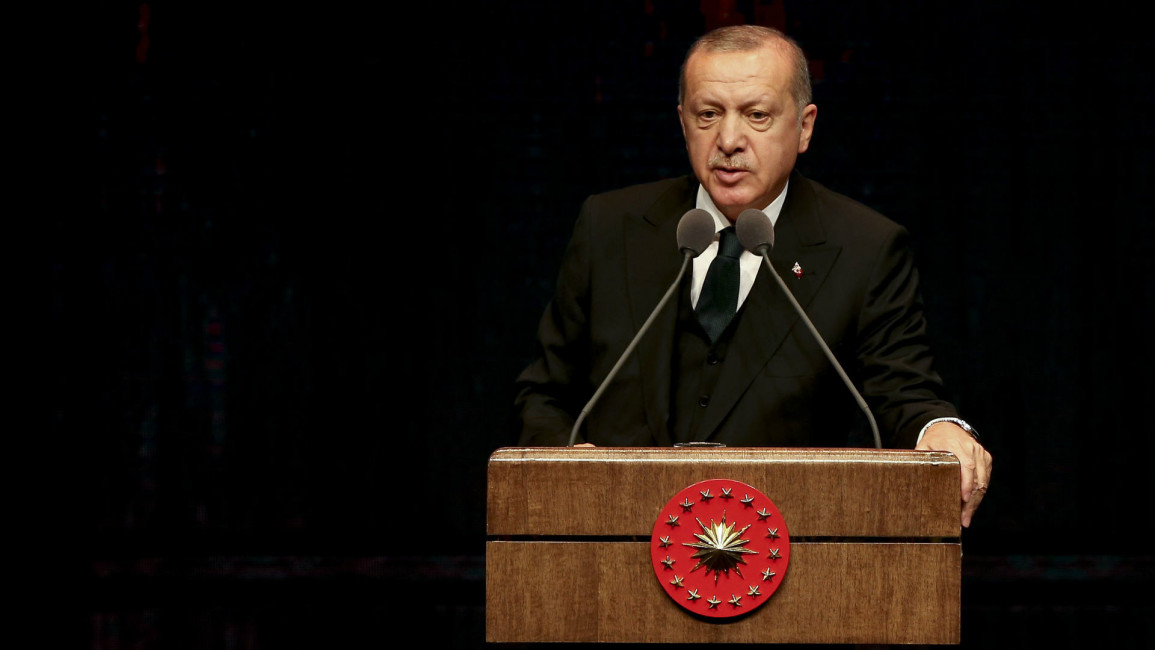Erdogan hits back at 'hypocritical' Western recognition of Armenian genocide, calling deportations 'appropriate'
Turkish President Recep Tayyip Erdogan on Wednesday hit back at Western nations for recognising the Armenian genocide, claiming the mass deportation of Armenians by Ottoman troops had been "appropriate" at the time.
Erdogan's comments came as he addressed a symposium on Turkey's archives at the presidential palace in Ankara on 24 April, recognised by many as the Armenian Genocide Remembrance Day.
"The relocation of the Armenian gangs and their supporters, who massacred the Muslim people, including women and children, in eastern Anatolia, was the most reasonable action that could be taken in such a period," said Erdogan, according to Sabah.
Turkish officials have often justified the mass deportation and killings of Armenians during World War One by referring to the "rebellion" of armed Armenian groups against Ottoman rule and those groups' alleged "collaboration" with the Russian Empire during the war.
While some Armenians may have been involved in fighting against the Ottoman Empire, most were innocent civilians, including women and children, international scholars say.
Historians estimate around 1.5 million Armenians were killed in what many scholars call the first genocide of the 20th century, although Turkey disputes this figure.
At least 30 countries have recognised the Armenian genocide, including Canada, France and Germany, and its denial is criminalised in several European states.
"We see that those who attempt to lecture us on human rights over the Armenian issue themselves have a bloody past," Erdogan said on Wednesday, accusing France of having committed genocides in Rwanda and Algeria.
Ankara and Paris in February experienced renewed tensions over President Emmanuel Macron's decision to recognise 24 April as a national commemoration day for the Armenian genocide.
Turkey on Monday recalled its ambassador from Austria after parliamentarians in Vienna held a minute's silence for the victims of the genocide. The country has also previously recalled its ambassadors from Germany, the United States and the Vatican over the issue.
Calling on countries to consult Turkey’s official archives in order to find out the "truth" of the matter, Erdogan also accused other Western nations of hypocrisy over the Armenian genocide.
"Those who today wear the mask of human rights and democracy apostles are responsible for the biggest massacres humanity has witnessed in recent centuries," he said, recalling the Crusades.
"Those who talk about genocide seem to have forgotten [their] concentration camps," the president added.
While Erdogan implied that the contents of the Turkish archive would contradict recognition of the events as a genocide, historians say documents from the archives have allowed historians to provide more robust accounts of the genocide in recent years.
"The whole 'our archives are open' line gets stranger and stranger every year," tweeted historian James Ryan, who focuses on Turkish history. "It's definitely true, but this position pretty much tells you how much time RTE's [Erdogan] spent there."
Erdogan also addressed Aram Atesyan, General Vicar of Turkey's Armenian Patriarchate, in a letter on Wednesday.
"I remember with respect the Ottoman Armenians who lost their lives under [the] harsh conditions of the First World War and offer my sincere condolences to their grandchildren," he wrote, according to the Turkish Presidency's official Twitter account, describing the shared "grief" of Turks and Armenians.
"I kindly request you to avoid helping those who seek to create hatred, grudge and hostility by distorting our common history."



